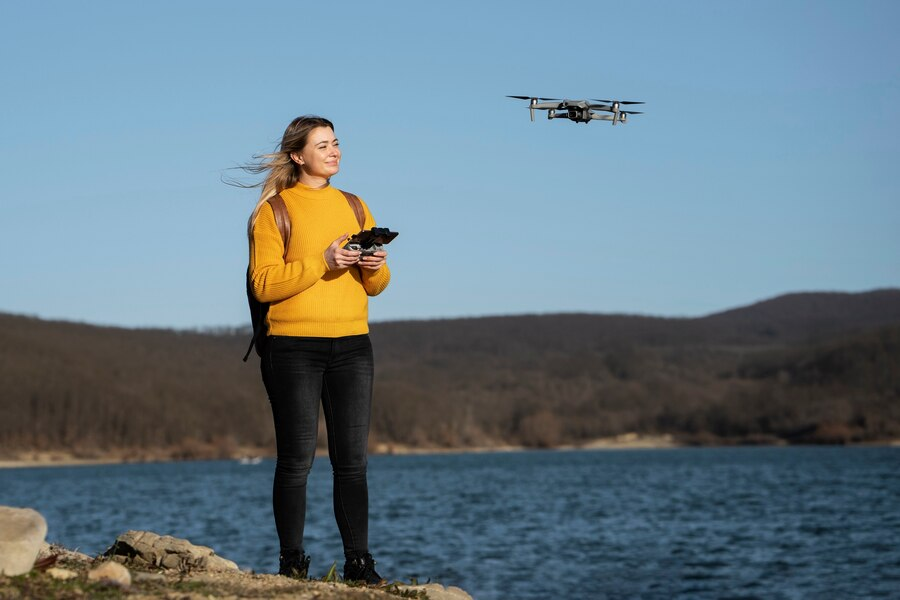Drones have come a long way from being niche gadgets to becoming essential tools for many industries. Whether you’re a hobbyist looking to capture stunning aerial photos or a professional in need of equipment for commercial tasks, knowing how to buy a drone that fits your specific needs is crucial. With so many options available on the market, it’s easy to get overwhelmed. But with the right knowledge, you can make a smart purchase that will serve you well for years to come.
Key Factors to Consider When Buying a Drone
Before making a purchase, it’s important to understand the key factors that determine the right drone for your needs. These factors vary depending on whether you’re buying a drone for recreational use or professional applications like aerial photography, surveying, or inspecting infrastructure.
1. Camera Quality
One of the most important considerations when buying a drone is the camera quality, especially if your main goal is capturing photos or videos. Drones equipped with high-resolution cameras (like 4K) offer superior image quality, essential for real estate photography, film production, and other visual media. If you’re purchasing a drone for work like a drone survey, a drone with a high-quality camera and additional sensors will ensure that you get accurate and reliable data.
2. Flight Time
Drone flight time can vary greatly depending on the model and battery capacity. Most consumer drones offer flight times between 20 and 30 minutes, but professional-grade drones may offer up to an hour of flight time. If your project requires long flights or working in hard-to-reach areas, you’ll want to prioritize longer battery life or look into extra batteries.
3. Range and Control
Another crucial consideration is the range of the drone, or how far it can fly from the operator. For recreational users, a shorter range might suffice. However, for professional drone operators, particularly those performing aerial surveys or inspections, a longer range is often necessary. Drones with enhanced control systems also allow for more precise movements, making them ideal for tasks like drone survey work, where accuracy is essential.
4. Size and Portability
For frequent travelers or drone users who need to carry their equipment on the go, portability becomes a key consideration. Some drones are foldable and compact, while others are bulkier but offer more stability in the air. If you plan to take your drone on business trips or outdoor adventures, look for one that can easily fit in a backpack without sacrificing performance.
Understanding Drone Features
Once you’ve narrowed down the basic factors, it’s time to dive into more specific features. Depending on your use case, certain features might be more relevant than others.
1. GPS and Stabilization
For drones that require precise control, such as when you’re flying in windy conditions or conducting a drone survey, having GPS functionality and stabilization is key. These features help keep your drone steady during flight, allowing you to capture clear photos and video footage. GPS also helps with automatic return-to-home functionality, which ensures that your drone safely returns to you in case of connection loss or low battery.
2. Obstacle Avoidance
For beginners or anyone flying in unfamiliar territory, obstacle avoidance systems can prevent accidents. These systems use sensors to detect objects in the drone’s path and can automatically change the drone’s course to avoid a collision. This feature is invaluable for novice drone users, or if you’re working in areas with lots of obstacles, such as dense forests or urban environments.
3. Automation and Smart Features
Many modern drones come with smart features that can make your flights easier and more efficient. Features like automatic flight modes, follow-me functions, and waypoints let you set a course for the drone to follow, enabling more hands-off operation. These functions are especially useful for aerial filming and tasks such as surveying large areas of land.
Drone Accessories and Additional Equipment
When you buy a drone, it’s often helpful to invest in additional accessories that can make your flying experience smoother. Accessories like extra batteries, propeller guards, carrying cases, and ND filters can enhance your drone’s performance and protect your investment.
1. Spare Parts
Accidents happen, and when they do, having spare parts on hand can save you time and money. Some common parts that might need replacing include propellers, landing gear, and batteries. Always check if spare parts are easily available for the model you’re purchasing.
2. Carrying Case
A carrying case is a must-have accessory for anyone who plans to travel with their drone. These cases protect your drone during transport and keep all your accessories organized. If you frequently take your drone on trips or fieldwork, a durable, weather-resistant carrying case can be invaluable.
Legal Considerations When Buying a Drone
Before you start flying your new drone, it’s essential to familiarize yourself with local regulations. Many countries have strict laws around where and how drones can be flown, especially when it comes to flying near airports, over people, or in restricted airspace. Be sure to check the regulations in your area and, if necessary, register your drone with the appropriate authorities.
For example, in the UK, if you’re using a drone for commercial purposes like a drone survey, you’ll need a drone operator’s license. This ensures that you’re operating your drone safely and within the confines of the law.
When It’s Time to Buy a Drone
Once you’ve evaluated all the necessary factors—camera quality, flight time, range, and features—it’s time to make your decision. If you’re looking for a drone that will stand the test of time, be sure to choose a model from a reputable brand with excellent customer support and warranties.
At Heliguy, we offer a wide selection of top-rated DJI drones, making it easier for you to find the perfect drone for your needs. Whether you’re purchasing for business or recreational purposes, we have a range of options to suit every budget and requirement.
Conclusion
Buying a drone is an exciting investment that can significantly enhance your ability to capture stunning aerial footage, collect data, or simply enjoy the thrill of flight. However, making the right choice requires careful consideration of factors such as camera quality, battery life, and specific features like GPS and obstacle avoidance.
By following this guide, you’ll be well-equipped to make an informed decision and find the perfect drone for your needs. Once you’ve made your purchase, don’t forget that drone survey services can help you get the most out of your new drone, ensuring that it’s optimized for your professional needs.


